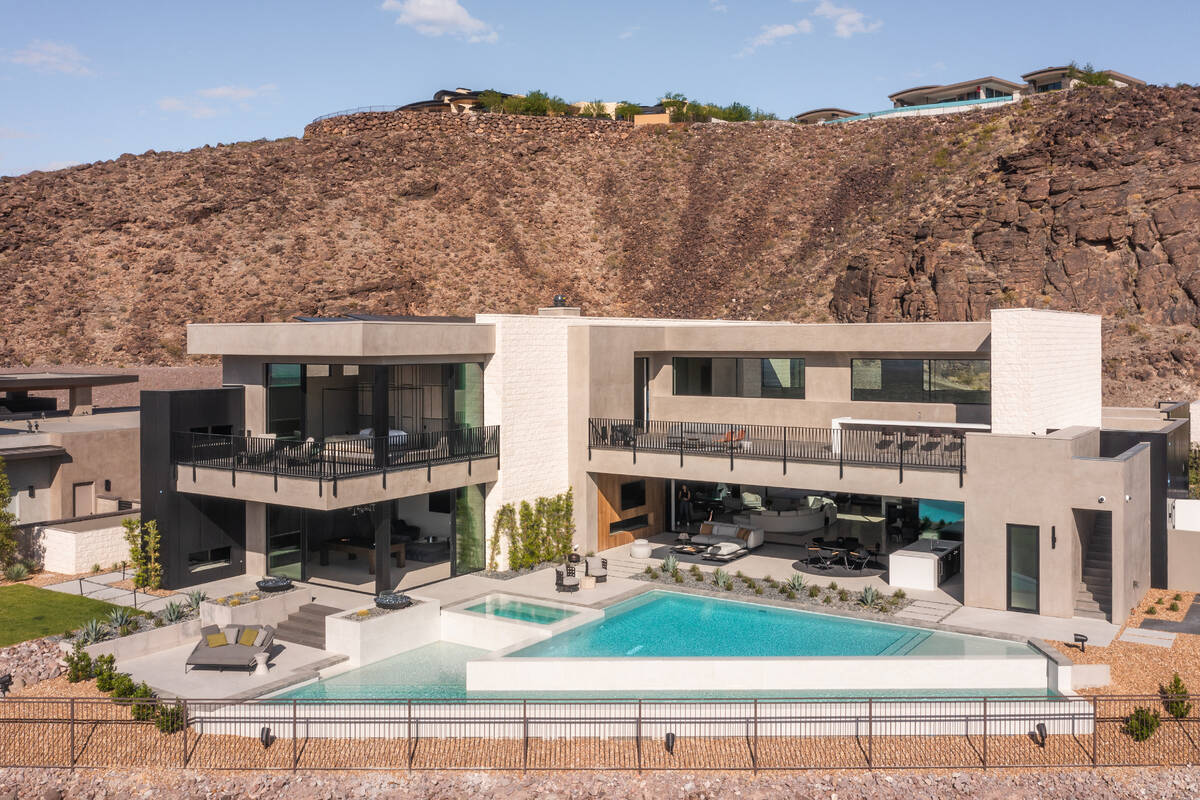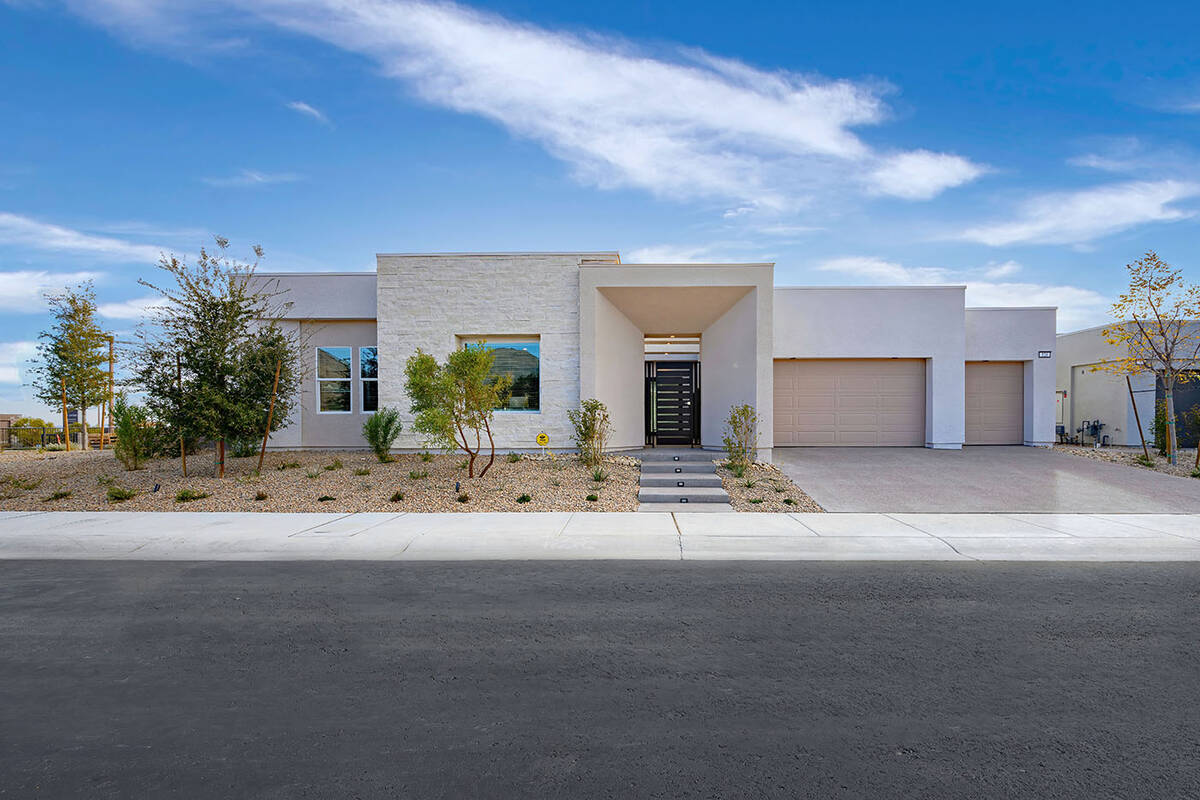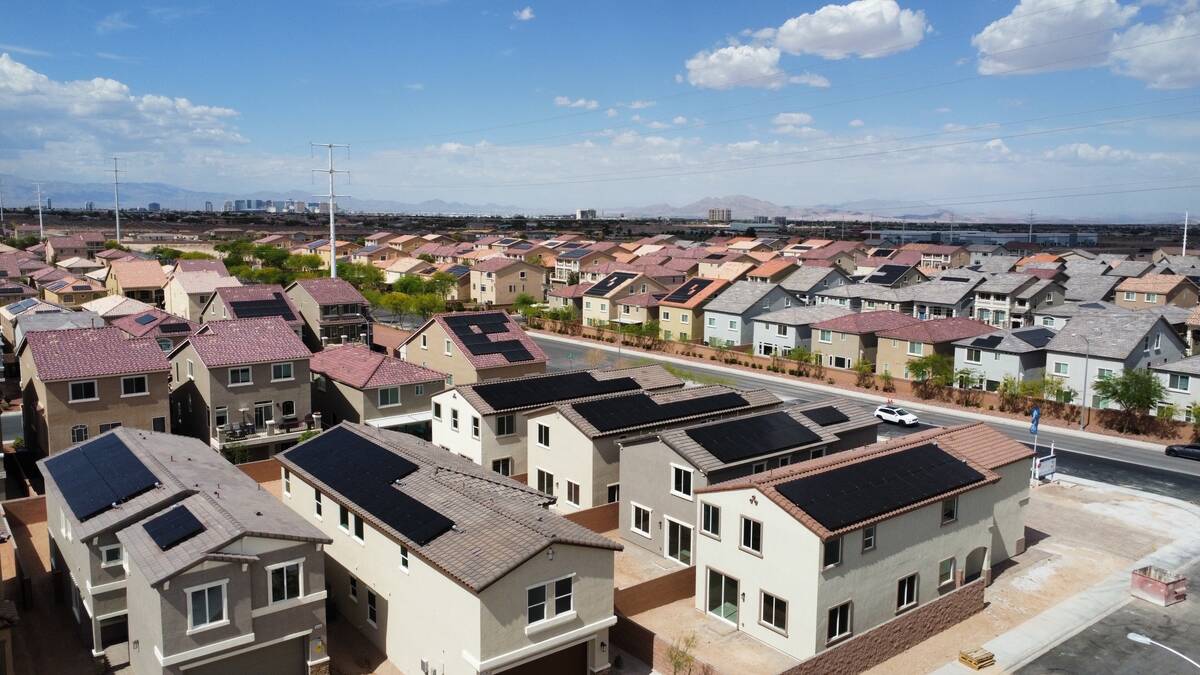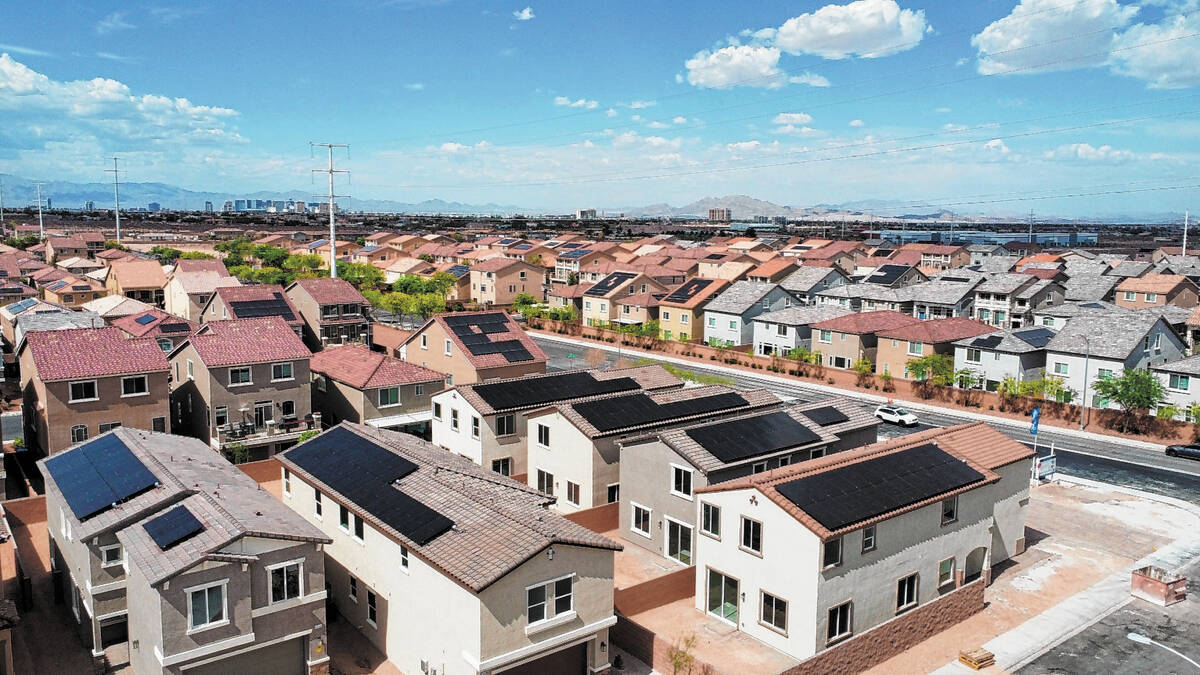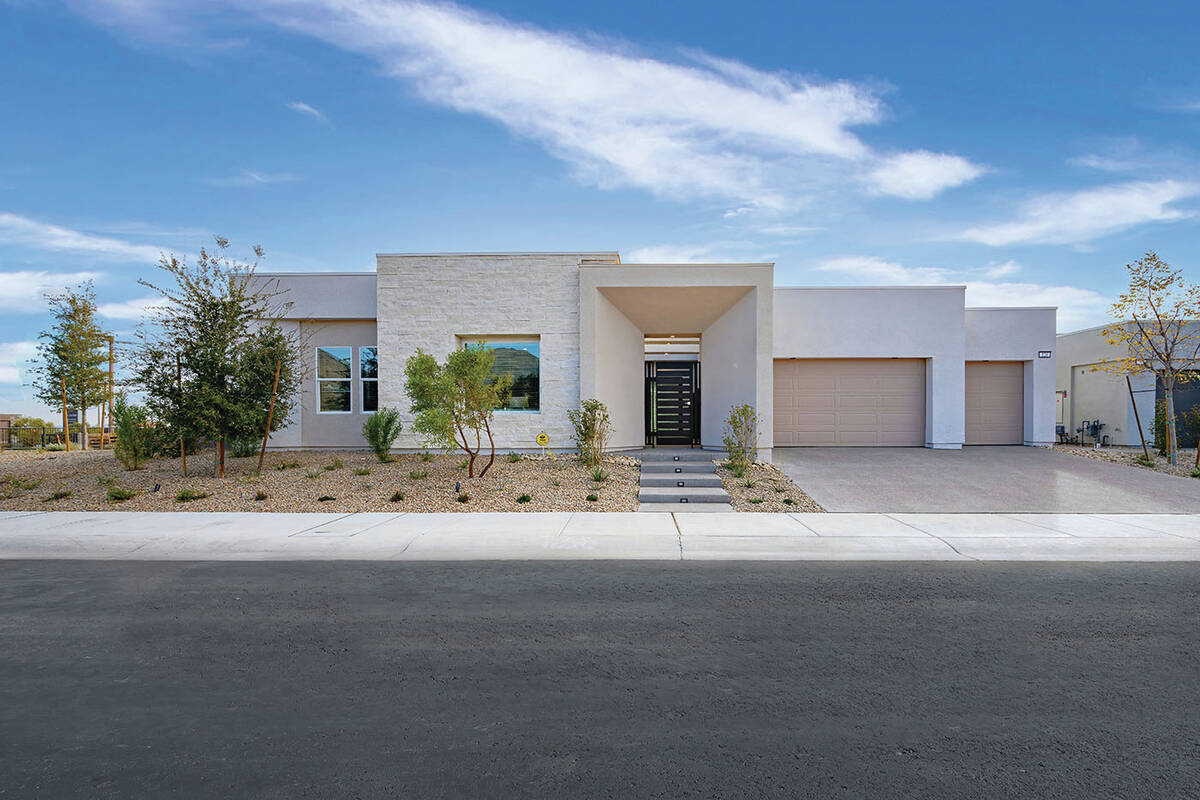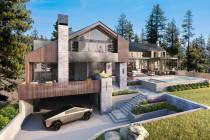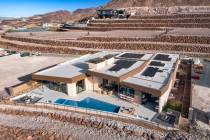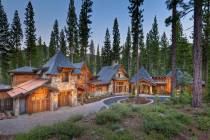Luxury homebuilders reach for the sun; include integrated solar power systems
The rooftop solar power industry is poised to surge again over the next decade in Southern Nevada. A federal Investment Tax Credit and other financial incentives make solar panel and energy storage installations more justifiable for homebuilders, while providing an attractive return on investment for potential homebuyers.
Lennar has developed The Arches community within the Redpoint village of Summerlin this year. The homebuilder is selling 51 homes with integrated rooftop solar power systems that include 20 solar panels to provide 7.8 kilowatts of electric power when the sun is shining, a back-up battery storage system that provides 13.5 kilowatt-hours of electricity when the sun isn’t shining, as well as two charging stations for electric cars. Home prices start from $1.58 million for 3,775 square feet of living space up to $1.68 million for 3,976 square feet.
Sunnova Energy International Inc. purchased the Sun Street Energy subsidiary from Lennar Group in April 2021 and now partners with homebuilders to provide integrated solar power system installations for selected new-home communities.
Michael Gardner of studio g Architecture and Luxus Design Build created a luxury home in the Ascaya community of Henderson as a showcase for the International Builders Show during February of this year. The New American Home 2023 was valued at $15 million and enveloped more than 8,000 square feet of living space. Construction was sponsored by the National Association of Homebuilders to highlight multiple home product suppliers during a trade show at the Las Vegas Convention Center.
Gardner worked with energy auditor Two Trails to measure and document the efficiencies of the homebuilding project. The team achieved an Emerald certification from the National Green Building Standards program of the NAHB, as well as certifications from the U.S. Department of Energy’s Zero Energy Ready Home program and its Energy Star program.
To enhance Gardner’s energy-efficient design, The New American Home 2023 project installed 19 kilowatts of photovoltaic solar panels and 20 kWh of backup battery storage to generate electricity from the desert sun.
“Energy efficiency and solar power are not the first amenities that luxury homebuyers normally consider,” Gardner said.
However, he felt that by combining these features with water conservation, temperature regulation, air refreshment, lighting and programmable smart electronics into an integrated performance home, visitors to the showcase would feel the subtle quality of the living space that could benefit them every day.
“Wellness can be defined by the environment the home creates, as well as the functionality and features of the home,” Gardner said.
Signature Homes has been building residential dwellings within Southern Nevada for the last 45 years. The company also has partnered with Sunnova Energy International Inc. to provide rooftop solar power as a standard feature to prospective buyers for its Blue Sky Trails new-home community. Signature Homes will be developing three new communities of town homes within the Las Vegas Valley over the next two years where rooftop solar panels will be installed as standard features.
“We wanted to set ourselves apart from the competition,” said Andrew Torgersen, vice president of sales at Signature Homes. “How can we offer something different that people are looking for? We do an energy calculation study on all our floor plans. Then we size the amount of solar panels to offset that usage.”
Touchstone Living is developing three communities in Las Vegas that will include rooftop solar panels as standard features. The Independence community is being built on the site of a former golf course in east Las Vegas and will eventually include 1,600 homes. The first 100 homes are in production and all of them will include rooftop solar panels. The Watercolor and First communities also offer models with standard rooftop solar power installations. The electric power generation capacity will range from 4 to 6 kilowatts, depending on the size of the homes.
“Solar has become so efficient, it is now cost-effective and a lot less expensive to install upfront during the homebuilding process,” said Tom McCormick, president of Touchstone Living. “It is also a lot easier to finance when the installation can be included in a first mortgage. All of our homes are Energy Star-certified and all-electric, resulting in lower energy costs each year.”
Touchstone Living has partnered with Tesla and Sunnova Energy International Inc. to install solar power systems within the homebuilder’s communities.
During August 2022, the Inflation Reduction Act was passed by the U.S. Congress and signed into federal law by President Joe Biden. Many rebates and tax incentives will be rolling out during 2023 to homeowners and homebuilders to encourage them to create more energy-efficient and sustainable homes, as well as install rooftop solar power systems.
Starting from Jan. 1 of this year, residential homeowners can receive a 30 percent tax credit on their personal income tax returns for the installed cost of rooftop solar power systems on their homes. This new rate has been increased from an ITC of 26 percent that was available during tax year 2022 and has been extended for 10 years.
Net metering credits from electric utility NV Energy also can help lower a monthly power bill. These monthly credits return at least 75 percent of the market value of every excess kWh of electricity generated from installed solar panels, when routed to a the NV Energy grid through the home’s utility meter.
According to the Public Utilities Commission of Nevada, state residents have installed about 530 megawatts of net-metered rooftop solar power systems as of Feb. 13, the equivalent of one large utility-scale power generation plant (puc.nv.gov/Renewable_Energy/Net_Metering).
NV Energy can assist local homeowners to size and scale the amount of rooftop solar power available to them. Contact an energy adviser for the utility’s Clean Energy program. The company’s website pages provide a rooftop solar installation calculator tool and application instructions for the net-metering program (nvenergy.com/cleanenergy/solar).
The Inflation Reduction Act also offers investment tax credits and rebate incentives to homeowners and homebuilders to perform energy-efficient remodeling projects that can bring existing buildings closer to net-zero energy guidelines.
An Energy Efficiency Home Improvement Tax Credit program under the Inflation Reduction Act allows households to deduct up to 30 percent of the cost of home upgrades that include heat pumps, insulation, weatherizing and electric panel capacity. The tax credit is limited to a maximum of $600 per project or $1,200 per household per tax year.
One exception to the investment tax credit restrictions are HVAC system upgrades that include a heat pump, where a tax credit for 30 percent of the project does not have an upper limit.
A New Energy-Efficient Home Tax Credit also allows homebuilders to deduct a $5,000 tax credit on new homebuilding projects that qualify for the U.S. Department of Energy’s “Zero Energy Ready Homes” standards of construction. The tax credit is available for single-family, multifamily and manufactured homes. Homebuilder remodel projects that go through a “deep retrofit” to comply with Zero Energy Ready Homes standards can apply for this tax credit.
The Inflation Reduction Act of 2022 also offers rebates instead of tax credits for homeowners and homebuilders who install energy-efficient heat pump systems, select Energy Star appliances, electrical panel and wiring upgrades, insulation, air sealing and ventilation projects under the High-Efficiency Electrified Home (HEEH) rebate program.
Alternatively, remodeling and retrofitting projects that can show an annual energy usage reduction of 35 percent are eligible for separate rebates under the Home Owner Managing Energy Savings (HOMES) program of the IRA. The rebates can cover 80 percent of the cost of a remodeling project up to a maximum of $8,000. Questions about qualifying for IRA rebate programs can be emailed to the U.S. Department of Energy at IRAHomeRebate@hq.doe.gov.
As of June 1, the city of Henderson began the requirement of a residential photovoltaic system permit authorization form as part of a permit submittal package by a solar power installer. The authorization form describes the relationship between the solar contractor and the property owner, including the personal contact information of the property owner, in order to verify consent.
The additional permit form was enacted by the city of Henderson in response to industry and customer concerns regarding multiple permit applications by various contractors for the same address and also permit applications submitted for projects without the property owner’s consent.
In June, the Nevada Legislature passed Senate Bill 293 that was signed into law by Gov. Joe Lombardo. The new law requires that rooftop solar power installation contracts must show any upfront costs, monthly payments and a schedule of the time required for the installation. SB293 also gives customers the right to cancel an installation contract if these provisions are missing and provides an unconditional exit path for a customer to cancel a contract within 72 hours of agreement, if the buyer has second thoughts.
Under SB 293, all rooftop solar installers are required to be affiliated with a state contractor’s license, in order to assign responsibility for any workmanship issues or consumer misrepresentation.
Consumers should still do their homework to review sales and service contracts carefully and study online company reviews before buying or leasing rooftop solar products from an installation company.
Potential customers should take the time to check out a solar panel installer to make sure the company has a legitimate Nevada contractor’s license number that has been registered with the Nevada State Contractors Board. This consumer protection agency handles more than 15,000 registered licenses for companies in all of the construction trades. A Nevada contractor’s license is required to receive permits from local government building departments. The five-digit license number and the contractor’s integrity can be verified through the NSCB website nscb.nv.gov.
Shoddy construction or business practices can be addressed by filing a formal complaint with the Nevada State Contractors Board. The agency can investigate, verify and enforce workmanship violations or infractions up to four years after a rooftop solar system has been installed. Enforcement can entail fines and suspensions of a contractor’s license if an investigation verifies a consumer complaint.
In the past, Nevada homebuilder companies have installed prewired electrical harnesses and enlarged conduit space to accommodate installations of residential solar power systems within new-home communities. However, the final decision to install a photovoltaic solar panel system on a new home had usually been left to the buyer as an option.
That industry trend may change in the future due to the recent 10-year extension of the Investment Tax Credit for solar power installations. Additional incentives from the Inflation Reduction Act can provide bonus tax credits for renewable energy and energy-efficient building projects that benefit rural, tribal and underserved communities in each state.
“The 10-year extension of the Investment Tax Credit gives us much better visibility into the future regarding financial investments,” said Romie Basra, a commercial banking sustainable tech practice lead at Wells Fargo. “We’ve seen a good track record for successful commercial solar power investments over the last 15 years and have been able to gather a lot of data.”
Wells Fargo has been an investor in commercial solar power projects at Nellis Air Force Base during the past decade. The financial services company began a campaign during 2021 to deploy $500 billion in capital by 2030 that would be targeted toward investments into industries that are developing sustainable technologies, especially innovative startup companies that can move the renewable energy industry forward.
Besides the commercial banking industry, Nevada developers will have the opportunity to apply for additional federal government grants through the Greenhouse Gas Reduction Fund within the Inflation Reduction Act. The U.S. Environmental Protection Agency is administering $27 billion of investment capital that will be made available to all 50 states through a “green bank” financial system. Local green banks will target the development of resilient and sustainable housing projects for rural, tribal and underserved communities.
The Nevada Clean Energy Fund (NCEF) was formed by the Nevada Legislature during 2021. The statewide green bank became active as a nonprofit organization on Jan. 1, with the installation of a board of directors and the appointment of Kirsten Stasio as executive director. More information about the NCEF and its low-interest, long-term loan programs can be found through its website at nevadacef.org.



